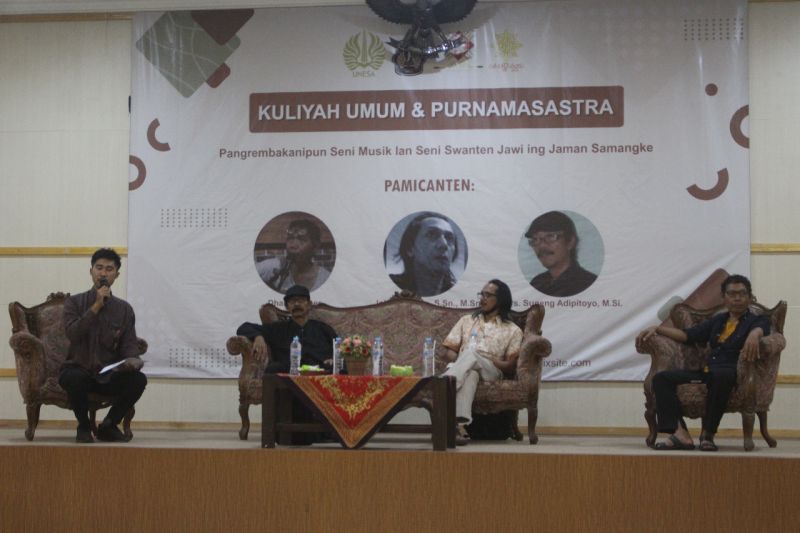
www.unesa.ac.id
Unesa.ac.id, SURABAYA—The Student Association of Regional Language and Literature Department (HMJBSD), Faculty of Languages and Arts (FBS) State University of Surabaya (UNESA) held an offline public lecture at the Auditorium, Building T-2, FBS, Lidah Wetan Campus, on Wednesday (7/12) /2022).
This Public Lecture presented, 1) Ethnomusicologist and lecturer in Music Arts, UNESA, Joko Winarko, S.Sn., M.Sn., 2) Drs. Sugeng Adipitoyo, M.Sc., lecturer at the Regional Language and Literature Department of Unesa, and 3) Purwanto or Dalang Poer, puppeteer, Javanese music maestro, and singer from Ngawi. The moderator on duty is Danang Wijoyanto S.Pd., M.Pd. as a lecturer at the Unesa Regional Language and Literature Department.
The theme that was carried out in this public lecture was "Pangrembakanipun Seni Musik and Seni Swanten Jawi ing Jaman Samangke" (Development of Modern Javanese Musical Arts and Sound Arts). The event is an annual HMJBSD program which is broadcast live on the @BharadaTV_ID YouTube channel. Participants who attended were active students of JBSD.
The Secretary of JBSD, Latif Nur Hasan, S.Pd., M.Pd., in his remarks said that this public lecture was intended to open discussions about the world of Javanese music. As is known, Javanese music belongs to the music that is popular with the community. The hope is that this activity can equip students so they can recognize and become initiators of Javanese music in the current era.
On that occasion, Joko Winarko shared his experiences about his journey as a musician. Since childhood he has been raised in a family of Yogyakarta artists. Thus, the demands of the environment shape the character of the musicians from that point on. At one point, Joko felt the need for modifications in music. The reason is that music will be more accessible to society if presented in a different form. He also tried to escape from the influence of the environment which he felt was monotonous and tried to be different ever since.
Joko went through experience after experience with music. He even had the task of 'organizing' gamelan music in an area of East Java that had never been known before. However, this further spurred his enthusiasm to initiate artistic experiences in music. Over time, Joko finally came into contact with the world of music at a more complex level, leading him to become an ethnomusicologist and now a lecturer.
Aesthetic music must be based on insight into the surrounding environment, such as phenomena that exist in society. In addition, music must also involve feelings, both personal feelings and those of others. Thus, the form of music will seem alive and its contents are more substantial. "Art is not about the target, but how the music can describe a certain situation," he said.
Meanwhile, Poer said, Javanese music has not shown significant progress. Javanese music performed by Javanese singers is now experiencing a decline. This is because the majority of Javanese music is now only focused on elements of romance.
“Javanese music should act as a mediator of aspirations. The use of the Javanese language in the village environment is still dense and more easily understood by the community. Therefore, music becomes a vehicle for conveying feelings, "said Dalang Poer.
After that, Dalang Poer also played several of his song titles such as: "Kudu Misuh", "Gang Dolly", and his most phenomenal song entitled "Langit Mendhung Kutha Ngawi". The songs that he brought were expressions of people's grievances that occurred in rural areas. The participants roared with each other enlivening the whole room. One by one the songs were dissected by Dalang Poer in order to invite the participants to find out what was the intention behind the creation of these songs.
Sugeng Adipitoyo as the third speaker, explained that Javanese music genres are very diverse. Starting from keroncong, campursari, koplo, etc. "We don't need to worry anymore about choosing which genre is suitable for our songs," he said. The thing to think about is how to continue to be consistent in creating Javanese music itself. As for the popularity of a song, it is completely out of our control. "The orientation in creating Javanese music is not about achieving popularity, but how do we appreciate music and maintain the progressivity of Javanese music itself," he concluded. [UNESA PR]
***
Author: Ahmad Rizky Wahyudi
Editor: @zam Alasiah*
Photo: Documentation by Ahmad Rizky Wahyudi
Share It On:






